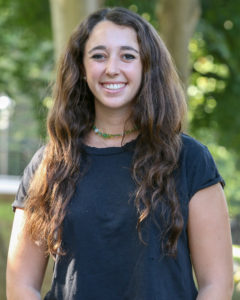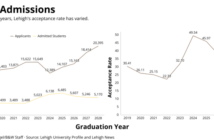
Karli Wachtel
When I was 12 years old, two strangers changed the way I observed the world.
I will never forget the rainy spring day in seventh grade when I walked to catch the M86 crosstown bus in New York City after a long day of school. I was wearing a denim skirt and probably an Abercrombie T-shirt — a typical outfit for a middle school girl at the time.
I had almost reached the bus stop when I heard two men whistle and yell out of a moving vehicle. I raised my head, searching for the source of the noise.
There they were, pressed up against their window, looking directly at me with smug smiles and continued their banter. It was directed toward me.
This was the first time.
I will never forget the sticky summer day when I returned from camp counselor orientation, exhausted and sweaty. The day was long, and the rush hour traffic had made it longer.
Standing at the corner, I listened to my iPod and waited to cross the street. A man approached me, stood an arm’s length away, winked and said, “Pretty girl, let’s see that smile.” I was a sophomore in high school.
This was not the last time.
I will never forget the cool, September night when I walked down an empty Hillside Avenue with a friend. We were in good spirits.
It was eerily quiet and pitch black. A tan sedan appeared on the street and slowed down, following us. No one else was on the sidewalk. No other cars were on the road.
The man driving the car rolled down his windows, whistled and said, “Hey ladies.” We ignored him and kept talking, still aware of his looming presence. After two minutes of following us slowly in his car, he tried again.
“Do you want a ride, ladies?”
We ignored him again, so he revved his engine and sped away. We were no longer smiling.
These are a few of the many stories where I experienced catcalling and street harassment.
It started at age 12 and has continued ever since. Both alone and with girlfriends, I am whistled at. Called derogatory names. Followed.
Every time, I am left feeling humiliated, threatened and unsafe in my own skin.
Even this week, I walked to my friends’ house to simply borrow some butter for cookies. I was outside for three whole minutes.
In that time, I was followed by a man in his car. In broad daylight. He rolled down his windows, honked at me and told me he liked my figure.
Humiliating.
Every time strangers chirp at me, I want to crawl out of my skin. Every time strangers yell at me, I want to hide.
With my own ears, I’ve heard both men and women make light of catcalling. They may think being whistled at and called sexy by a stranger is “harmless.”
“It’s a compliment,” they say. “It’s nice to get some attention now and then.”
People approve street harassment by undermining the severity of catcalling and declaring it acceptable in society.
This issue should not be taken lightly if it makes women of all ages across the globe feel anxious, uncomfortable and unsafe.
In 2014, Cornell University partnered with Hollaback!, an online initiative to end harassment around the world, to conduct an international survey on street harassment. The survey had 16,607 respondents, making it the largest international cross-cultural study of street harassment.
These results show that the majority of women experience their first form of street harassment before they even hit puberty. The implication of this fact is disturbing — think about grown men sexualizing young girls in public. This should not be socially acceptable.
Think about any of those girls growing up and becoming women, still sexualized in public. They will have grown up experiencing a form of harassment meant to make them feel uncomfortable, violated and objectified — not beautiful or confident.
Men who dish out whistles and catcalls assert their self-proclaimed entitlement and dominance over women’s bodies. Those who sit and observe this behavior instead of saying something fall victim to the bystander effect.
Everyone should feel comfortable in their own skin, regardless of who they are or what they look like. If you see someone being made a victim on the street, say something.
For those who adopt catcalling to assert their dominance, blow off some steam or appear more manly: you know the act is wrong.
It is time to seriously consider how your actions are affecting others and make a change.
—
Karli Wachtel, ’18, is a columnist and reporter for The Brown and White. She can be reached at [email protected].





Comment policy
Comments posted to The Brown and White website are reviewed by a moderator before being approved. Incendiary speech or harassing language, including comments targeted at individuals, may be deemed unacceptable and not published. Spam and other soliciting will also be declined.
The Brown and White also reserves the right to not publish entirely anonymous comments.
1 Comment
As a woman who went to college in the 1970’s it makes me both sad and pleased to read this article. Sad because, this type of harassment is still going on so clearly many men have not evolved in their attitudes towards women, and pleased because the author is insightful in her analysis of these events and courageous to express her thoughts and feelings publicly, during a time when feminism is often considered old fashioned. I hold out hope that as more women get “woke” that this sort of behavior is not OK and should not be shrugged off, they will make it a point to teach their sons to treat women with respect.